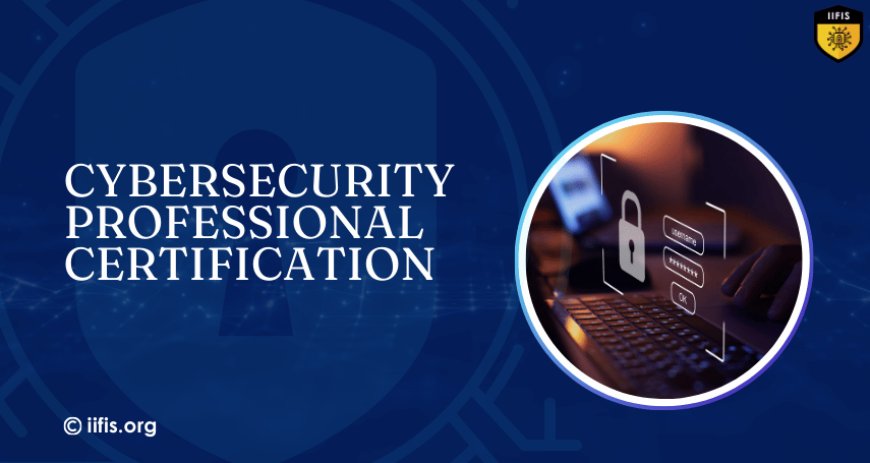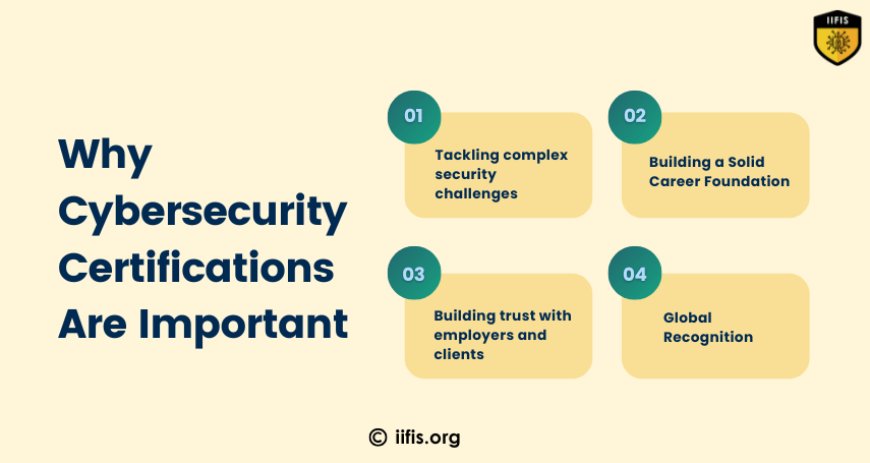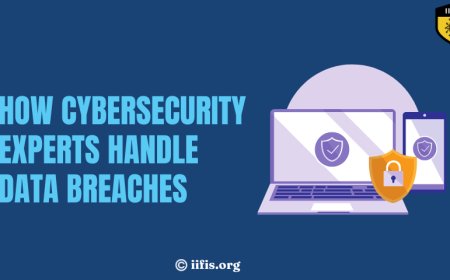Cybersecurity Professional Certification for Career Growth
Improve your career with cybersecurity certifications. Build your skills, earn more, and open up new job opportunities in the growing cybersecurity industry.

A few years ago, while working in IT support, I noticed the rising number of cyberattacks and data breaches, highlighting the growing need for skilled cybersecurity professionals. This inspired me to pursue a cybersecurity professional certification. These certifications not only boosted my skills but also opened new career opportunities, increased my salary, and helped me shift from IT to a cybersecurity consultant role.
The recognition from employers and my growing confidence showed me that certifications are key to career growth and staying relevant in this fast-changing field. Looking back, it was a game-changer, and I highly recommend it to anyone interested in cybersecurity.
The Growing Demand for Cybersecurity Professionals
The increase in cyberattacks, data breaches, and advanced hacking techniques has made it clear that cybersecurity is no longer a luxury but a necessity. According to recent studies, the number of cybercrimes is increasing at an alarming rate, making organizations invest heavily in cybersecurity defenses. This increase in threats has, in turn, led to a massive rise in demand for cybersecurity professionals, including analysts, engineers, and consultants.
How Cybersecurity Certifications Help in Career Growth
Cybersecurity certifications are not just a way to prove your qualifications—they are also a powerful tool for career advancement. Here’s how they contribute to career growth:
-
Skill Enhancement: Cybersecurity certifications are designed to keep professionals up to date with the latest security trends, technologies, and best practices. Through structured learning, you’ll gain practical experience and improve your technical skills, making you more effective in your role.
-
Higher Earning Potential: Certified cybersecurity professionals are often compensated at a higher rate than their non-certified peers. According to industry surveys, certified professionals tend to have higher salaries and better job security, as organizations are willing to pay more for individuals who can safeguard their systems and data from evolving threats.
-
Expanded Career Opportunities: Holding a certification opens doors to a wide range of job opportunities in cybersecurity. Whether you’re interested in roles like security analyst, penetration tester, network security engineer, or even cybersecurity consultant, certifications make it easier to transition between different roles and progress in your career.
-
Recognition and Credibility: Certifications not only boost your confidence but also establish your credibility in the industry. When you have certifications from reputable organizations, employers and clients will trust that you know how to protect their digital assets and mitigate potential risks.
Why Cybersecurity Certifications Are Important
Cybersecurity certifications are essential for several reasons, and here's why they should be a priority for anyone looking to advance in this field:
-
Tackling complex security challenges: cybersecurity is a dynamic field with rapidly changing technologies and threats. A certification program ensures that professionals stay current with emerging trends and develop the technical expertise needed to tackle complex security challenges.
-
Building a Solid Career Foundation: If you’re just starting in cybersecurity, certifications provide a strong foundation for your career. Many entry-level positions require certifications to ensure you have the necessary knowledge to handle security tasks. By obtaining certifications early, you can accelerate your career trajectory and open the door to more advanced opportunities.
-
Building trust with employers and clients: In the cybersecurity realm, trust is paramount. Employers need to be certain that their employees can safeguard their networks, data, and systems from cyber threats. Certifications are an objective way for employers to verify your skills and knowledge, giving them confidence in your ability to protect their digital infrastructure.
-
Global Recognition: Cybersecurity certifications are globally recognized and respected. Whether you’re looking to work with a multinational corporation or a local business, certifications such as CISSP, CompTIA Security+, or Certified Cyber Security Manager are highly regarded and can open up job opportunities worldwide.

How to Upgrade from Beginner to Advanced in Cybersecurity
When it comes to advancing your career in cybersecurity, continuous learning and skill development are essential. Here's a step-by-step guide to upgrading from beginner to advanced in the field:
-
Start with the Basics: If you're new to cybersecurity, begin with foundational certifications such as Certified Cybersecurity Entry-Level Technician. These entry-level certifications will provide you with a solid understanding of cybersecurity principles, networking, and risk management.
-
Specialize with Intermediate Certifications: Once you have foundational knowledge, consider moving on to certifications like Certified Ethical Hacker (CEH) or Certified Information Systems Security Professional (CISSP). These intermediate certifications will allow you to dive deeper into areas like penetration testing, ethical hacking, and systems security.
-
Advanced Certifications for Expertise: After gaining experience and honing your skills, you can pursue advanced certifications such as Certified Information Security Manager (CISM) and Certified Cloud Security Expert (CCSE). These certifications focus on advanced topics like managing large-scale security programs, cloud security, and advanced network security. They are ideal for professionals who want to work in leadership or highly specialized cybersecurity roles.
-
Stay updated: cybersecurity is a dynamic field, and keeping your knowledge current is essential. Participate in ongoing education, attend industry conferences, and obtain certifications to ensure your expertise remains cutting-edge.
Cybersecurity Salaries and Career Outlook
Salaries in cybersecurity can vary based on experience, location, and the specific role you pursue. Overall, cybersecurity professionals are among the highest-paid individuals in the tech industry. Here's an overview of average salaries based on experience and role:
-
Entry-Level (0-2 years experience): Cybersecurity analysts or technicians typically earn between $60,000 and $80,000 annually.
-
Mid-Level (3-5 years experience): As you progress in your career, salaries for roles such as security engineers or penetration testers can range from $85,000 to $110,000.
-
Advanced-Level (5+ years experience): Senior positions like cybersecurity managers or consultants can earn salaries ranging from $120,000 to $160,000, depending on location and organization.
-
Specialized Experts: Professionals with specialized skills (e.g., cloud security, ethical hacking, or incident response) can command salaries upwards of $200,000.
The Challenge of Standing Out in a Competitive Job Market
-
Competitive Job Market: As demand for cybersecurity professionals grows, the job market has become more competitive, with organizations seeking candidates who possess specialized knowledge and technical skills.
-
Value of Experience and Training: While experience and on-the-job training are important, professional certifications are one of the most effective ways to stand out in the crowded cybersecurity field.
-
Certification Validation: A professional certification validates your expertise, proving to potential employers that you have the knowledge and skills to address complex cybersecurity challenges.
-
Employer Preference: Many employers prefer candidates who hold certifications from well-recognized organizations like CompTIA, CISSP (Certified Information Systems Security Professional), and CEH (Certified Ethical Hacker).
-
Edge in the Market: Holding certifications gives you a significant edge over other candidates who may lack formal recognition of their skills, setting you apart in the competitive job market.
Industries Investing in Cybersecurity Professionals
Almost every industry requires cybersecurity professionals to some degree, but some sectors are particularly vulnerable and need more extensive cybersecurity investment. These industries include:
-
Finance and Banking: Financial institutions deal with large volumes of sensitive data, making them prime targets for cybercriminals. Banks, investment firms, and insurance companies are continuously investing in cybersecurity to protect financial transactions and customer data.
-
Healthcare: With the rise of electronic health records (EHR) and medical devices connected to networks, healthcare organizations need skilled cybersecurity professionals to protect patient data from data breaches, ransomware, and other cyber threats.
-
Government and Defense: National security agencies and government bodies are always at risk from state-sponsored cyberattacks. As a result, this sector requires a robust cybersecurity workforce to defend critical infrastructure and sensitive government data.
-
E-Commerce and Retail: As more consumers shop online, e-commerce and retail companies are prime targets for cybercriminals looking to steal credit card information and other personal data. Cybersecurity professionals in this sector help safeguard payment systems and consumer privacy.
-
Technology and Telecommunications: Telecom and tech companies are constantly under attack due to the amount of data they manage and the critical infrastructure they control. Ensuring the security of communication networks and software is crucial for both consumers and businesses.
-
Energy and utilities: The energy sector, including oil, gas, and power plants, is increasingly reliant on technology and automation, making it a key target for cyberattacks that could disrupt operations. Cybersecurity professionals are needed to protect power grids and energy infrastructure.
Obtaining a professional certification is a valuable investment for career growth in any field. It enhances your skills, boosts earning potential, and opens doors to new opportunities. As demand for skilled professionals continues to rise, certifications play a key role in staying competitive and advancing in job market.
























